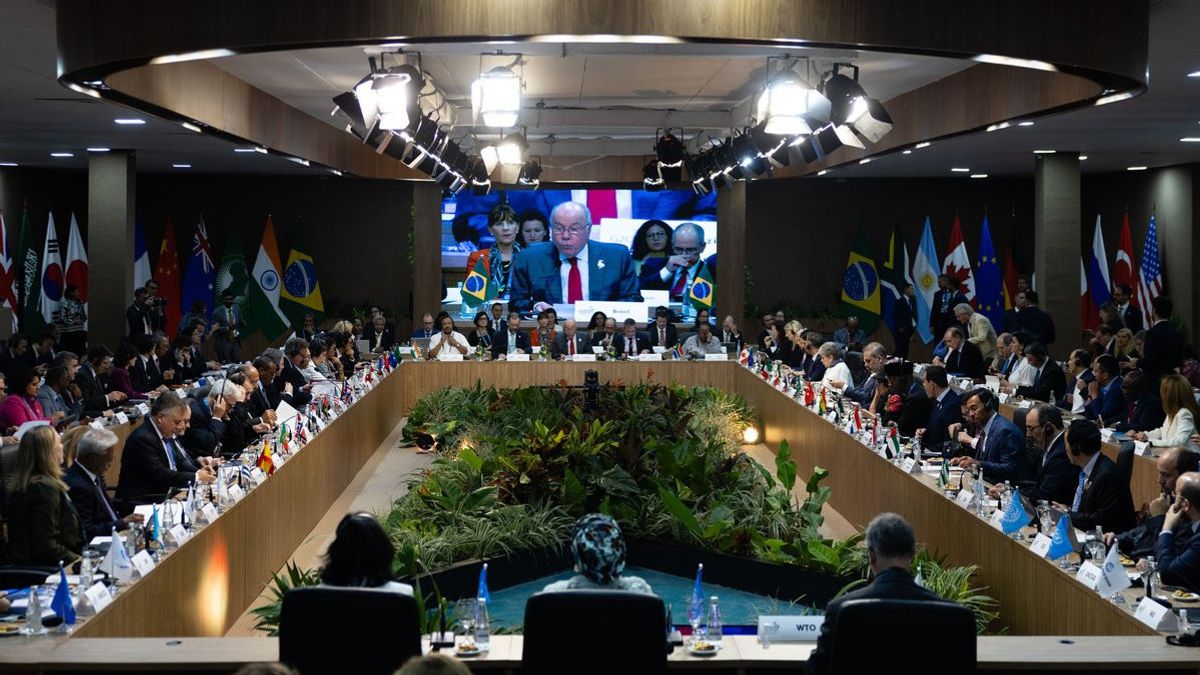JAKARTA - The G20 foreign ministers agreed to support a two-state solution, as the only answer to resolve the Palestinian Israeli conflict, at the alliance meeting in Brazil, the country's foreign minister said. "There is a unanimousness of votes in the two-state solution as the only solution to the conflict," said Brazil's Foreign Minister Mauro Vieira, at the end of the two-day meeting.
Vieira further said that all members of the country's largest economic group in the world highlight concerns about the war in Gaza, as well as the risk of spreading conflict in the Middle East.
Vieira said there were calls for a ceasefire and access to Gaza for humanitarian aid, while "many" countries criticized the Israeli military offensive in Rafah.
Meanwhile, US Secretary of State Antony Blinken said he found "equalities" with G20 members about Gaza, although the US vetoed a UN Security Council resolution on the conflict this week for the third time. This reflects growing international frustration with US support for Israel.
At a press conference after the G20 meeting, Foreign Minister Blinken said ending the conflict was a common goal, by means of achieving it through an agreement that helped the US become an intermediary between Israel and Hamas regarding the release of hostages.
"There may be differences regarding tactics and there may be differences regarding the resolution of the Security Council, but we are trying to focus on really getting results," Foreign Minister Blinken said.
Earlier, EU Head of Foreign Policy Josep Borrell said there was a consensus on the need for a two-state solution in Israel, supported by every speaker discussing the conflict.
"Everyone here, everyone, I've never heard of anything against it. There is a strong demand for a two-state solution," Borrell told reporters.
"It is a consensus between us. There will be no peace... there will be no sustainable security for Israel, unless Palestine has clear political prospects for building their own country," he said.
Borrell said the crisis in Gaza extends to the West Bank, which is "totally boiling" when Israeli settlers "attack Palestinian civilians."
The G20 Agrees On Two-National Solutions The Only Answer To Solve Palestine-Israeli Conflicts, Including The US
JAKARTA - The G20 foreign ministers agreed to support a two-state solution, as the only answer to resolve the Palestinian Israeli conflict, at the alliance meeting in Brazil, the country's foreign minister said. "There is a unanimousness of votes in the two-state solution as the only solution to the conflict," said Brazil's Foreign Minister Mauro Vieira, at the end of the two-day meeting.
Vieira further said that all members of the country's largest economic group in the world highlight concerns about the war in Gaza, as well as the risk of spreading conflict in the Middle East.
Vieira said there were calls for a ceasefire and access to Gaza for humanitarian aid, while "many" countries criticized the Israeli military offensive in Rafah.
Meanwhile, US Secretary of State Antony Blinken said he found "equalities" with G20 members about Gaza, although the US vetoed a UN Security Council resolution on the conflict this week for the third time. This reflects growing international frustration with US support for Israel.
At a press conference after the G20 meeting, Foreign Minister Blinken said ending the conflict was a common goal, by means of achieving it through an agreement that helped the US become an intermediary between Israel and Hamas regarding the release of hostages.
"There may be differences regarding tactics and there may be differences regarding the resolution of the Security Council, but we are trying to focus on really getting results," Foreign Minister Blinken said.
Earlier, EU Head of Foreign Policy Josep Borrell said there was a consensus on the need for a two-state solution in Israel, supported by every speaker discussing the conflict.
"Everyone here, everyone, I've never heard of anything against it. There is a strong demand for a two-state solution," Borrell told reporters.
"It is a consensus between us. There will be no peace... there will be no sustainable security for Israel, unless Palestine has clear political prospects for building their own country," he said.
Borrell said the crisis in Gaza extends to the West Bank, which is "totally boiling" when Israeli settlers "attack Palestinian civilians."
Israeli Prime Minister Benjamin Netanyahu and his far-right coalition government largely rejected the creation of a Palestinian state.
Even so, Washington, Israel's main ally, believes the two-state solution is the only feasible way to realize lasting peace in the region, but rejects calls from several countries, including Brazil, to immediately strike a ceasefire.
The G20 group's foreign ministerial meeting, chaired by Brazil this year, discussed various tensions in the world, mainly focused on the fighting of Gaza and Ukraine.
SEE ALSO:
Israeli Prime Minister Benjamin Netanyahu and his far-right coalition government largely rejected the creation of a Palestinian state.
Even so, Washington, Israel's main ally, believes the two-state solution is the only feasible way to realize lasting peace in the region, but rejects calls from several countries, including Brazil, to immediately strike a ceasefire.
The G20 group's foreign ministerial meeting, chaired by Brazil this year, discussed various tensions in the world, mainly focused on the fighting of Gaza and Ukraine.
The English, Chinese, Japanese, Arabic, and French versions are automatically generated by the AI. So there may still be inaccuracies in translating, please always see Indonesian as our main language. (system supported by DigitalSiber.id)


















